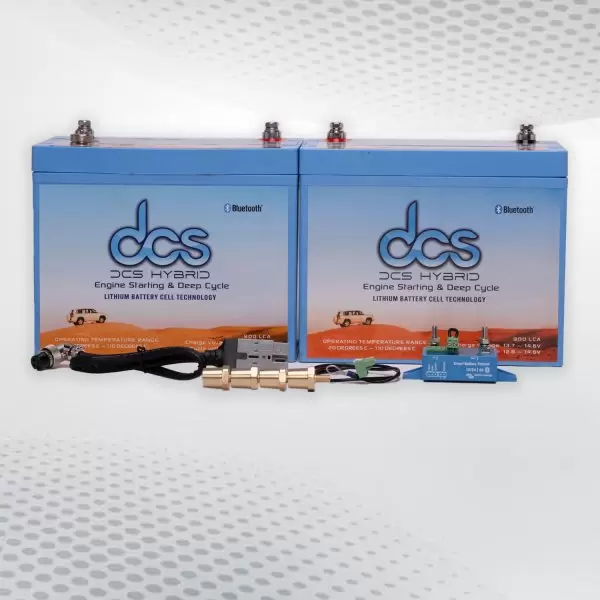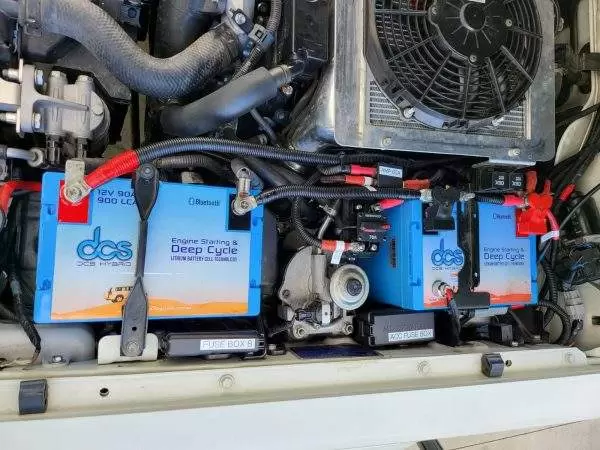If you’re planning a camping trip, you may wonder how to power your gadgets. If so, that article is for you. I’ll give you a thorough breakdown of the different types of Lithium Camping Battery available today and compare them side-by-side with my expert opinion. In addition, I’ll list some frequently asked questions about each battery type and what makes them unique and special. By the time we’re done here, you’ll know exactly which type of battery is right for your needs!
Lithium Camping Batteries
Lithium batteries are a great choice for camping because they have several benefits over traditional lead-acid batteries. They’re lighter and more compact than other rechargeable batteries, making them easier to carry around your campsite and store in your vehicle.
They will be recharged in as little as an hour, so you won’t need to wait long before using them again after each use. Lithium batteries have a higher energy density than lead-acid ones, which means they hold more power per unit volume or mass (and therefore last longer). The downside is that lithium’s cost more upfront than lead acids do–but their improved performance may justify the extra expense over time!
How Do Lithium Camping Batteries Work?
Lithium camping batteries are the most efficient and safest battery available today. They can provide more power than other types of batteries, making them a great option for long-term use in solar panels.
Lithium batteries have been around since the early 1990s, but they have only recently become popular with campers due to their high performance and low weight. Campers have used traditional lead acid batteries for decades because they are cheap, easy to find at any hardware store, easy to maintain (you need distilled water), reliable when not abused too much by overcharging/discharging cycles, etc.
The Benefits of Lithium Camping Batteries
The benefits of lithium camping batteries are numerous. First, they’re lighter than traditional camping batteries and will be recharged quickly. They last longer than traditional batteries and are safer as well. They also have lower internal resistance (less waste heat), making them more efficient at turning chemical energy into electricity. That means you’ll get more bang for your buck with a lithium battery than a standard lead-acid model!
Lithium batteries are also more stable than lead-acid models, meaning they don’t experience as much charge drop over time. That makes them ideal for use in vehicles that can run long distances at high speeds without stopping.
Lithium Car Battery
Traditional camping batteries are Lithium Car Battery. Lead acid batteries are less efficient than lithium batteries and will be dangerous when discharged too much or overcharged. They also take longer to recharge than lithium, another issue for those who use their RV for extended periods away from electricity sources. If you decide to purchase traditional camping batteries, make sure you know how much power they can output (in amps) before buying them so that you don’t overload them!
How Do Traditional Camping Batteries Work?
Traditional camping batteries are lead-acid batteries. They use a combination of lead and sulfuric acid to produce electricity when you need it most. The lead plates are submerged in sulfuric acid, which causes them to produce electrons that will be used to charge your devices or start your car’s engine. A series of cells comprise each battery–each cell contains one set of positive and negative plates, separated by an electrolyte solution (sulfuric acid). These cells are connected in series so that when you connect them, they form one large battery capable of storing more energy than its parts could provide separately.
Traditional Camping Battery Benefits
Traditional camping batteries are less expensive.
Traditional camping batteries are more durable than lithium camping batteries, which means they will last longer before needing to be replaced or recharged. That is especially important if you use your battery frequently or in harsh conditions (e.g., extreme heat or cold).
Traditional batteries are also easier to use than lithium ones because they don’t require any special maintenance and will be used immediately without any additional prep work required by users, such as charging beforehand or adding water before first use (which is necessary with lithium cells).
Lithium Camping Batteries Are the Way to Go
Lithium-based batteries have only recently been introduced into the camping industry, but they have already proven themselves as one of the most efficient and safest battery types currently available. They provide more power than traditional lead-acid or nickel-cadmium (NiCad) batteries, which means you can use them for longer periods without recharging them as often.
That makes them ideal for people who enjoy camping, as they can make your trip more comfortable and enjoyable while reducing the work you must do.
Lithium Batteries Are a Relatively New Invention
Lithium batteries are a relatively new invention. They were first used in the space program and have only been available to consumers since the 1970s.
However, lithium batteries have many benefits, making them an excellent choice for camping enthusiasts who need reliable power sources that can hold a charge for long periods without recharging them frequently (or at all).
Provide More Power than Other Batteries
Lithium-based batteries have a higher energy density than traditional lead-acid batteries, which can provide more power for a given weight. They also have longer lifespans and are more efficient to manufacture. In addition to these benefits, lithium-based batteries are safer than conventional batteries. They don’t contain toxic materials that can leak out of the battery casing and cause a fire or explosion if there is an accident.
Most Efficient and Safest
Lithium batteries are the most efficient and safest. They are more efficient than traditional batteries, meaning they can hold a charge for longer periods without needing to be recharged. That is especially helpful if you’re camping for weeks or months at a time. Lithium cells also have a much lower internal resistance than other types of batteries, meaning they produce more power per unit volume than other types of cells (which makes them safer).
Furthermore, lithium-ion cells do not require any maintenance aside from regular charging; they will not leak toxic chemicals if damaged in an accident or punctured by something sharp like glass or metal shrapnel from an explosion/firefight, etc., unlike lead acid batteries, which could potentially leak acid if damaged and pose serious health risks if ingested; finally, lithium-ion systems generate less waste material during manufacturing due to their lighter weight structure compared with lead-acid systems which require heavy metals such as mercury in addition to nickel-cadmium parts (NiCad’s).
Lithium Batteries Are a Great Option for Long-Term Use in Solar Panels
Lithium-based batteries are a great option for long-term use in solar panels. They can provide more power than other types of batteries, and they’re also the most efficient and safest.
If you have a solar panel, knowing what kind of battery will work best with it is important. Suppose you have an off-grid system that doesn’t need electricity at night (like during winter). Lithium batteries might be right for you because they last longer than traditional ones before needing to be recharged or replaced.
Lasts Longer Than a Traditional Camping Battery
Lithium batteries are more expensive than traditional ones but worth it. A lithium battery will last longer and perform better than a traditional one. You can recharge it quickly and safely, and it won’t leak like some other battery types.
The lithium-ion battery is an improvement over the traditional lead-acid battery. It can recharge quickly and safely and won’t leak like some other types of batteries. The lithium battery is a big improvement over the traditional lead-acid battery. It will last longer and perform better than a traditional one. You can recharge it quickly and safely, and it won’t leak like some other battery types.
Will be recharged quickly and safely
Lithium camping batteries are safe to use and will be recharged quickly. That makes them a great alternative to traditional camping batteries that are heavy and difficult to transport. One of the biggest advantages of lithium-ion technology is that it’s completely safe, even when used in extreme temperatures or conditions. Traditional lead-acid batteries don’t have that advantage; if you’re using one in cold weather, for example (below freezing), then there’s a chance that it could overheat and explode due to internal pressures building up inside the battery casing under these conditions.
Lithium-ion rechargeable batteries also charge much faster than traditional ones- typically an hour or less- and they hold their charge longer than non-rechargeable types do!
Reasons You Should Use Lithium Batteries
Lithium batteries are lighter than traditional camping batteries. Lithium batteries last longer than traditional camping batteries. Lithium batteries will be charged and discharged quickly, so you don’t have to wait as long to charge up before using them again!
Finally, they’re safer than traditional options because they don’t contain dangerous chemicals that could leak out if the battery were punctured or torn open (which isn’t uncommon when you’re on the road).
FAQs
How do lithium batteries work?
Lithium batteries are rechargeable batteries that use lithium ions to store energy. Charging the battery causes these ions to move from one electrode (the positive terminal) to another (the negative). When you discharge your battery, they return to its original position inside the cell. That movement allows electrical current to flow through your device and power it up as needed.
What are the benefits of lithium camping batteries?
Lithium camping Batteries offer several advantages over traditional alkaline or lead acid types: they’re lighter weight, last longer between charges, and hold more energy per unit volume than other options on today’s market, making them ideal for use in digital devices such as smartphones/tablets/cameras, etc.
Conclusion
That article has given you some insight into lithium camping batteries. They offer many benefits over traditional camping batteries, including longer life spans, faster recharge times, and higher energy capacity. If you’re looking for an upgrade over your current setup or want something new, I highly recommend giving lithium-based power sources a shot!



